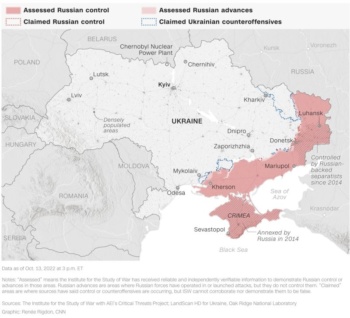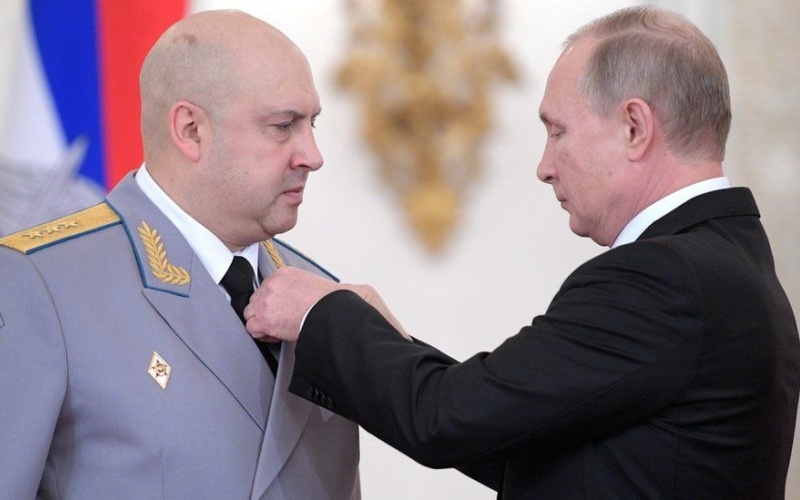Ukrainian troops raise the national flag above a hospital in Vysokopillia after liberation of the town in southern Ukraine from Russian occupiers, September 4, 2022
Jump to Original Entry
Tuesday’s Coverage: Zelenskiy — “The World Can and Must Stop This Terror”

Source: CNN
UPDATE 1634 GMT:
Turkish President Recep Tayyip Erdoğan has confirmed agreement with Vladimir Putin on creating a “gas hub” in Turkey.
Erdoğan told Parliamentary members of the ruling AKP that Putin’s tactic is to use the hub to counter sanctions on Moscow and sabotage — possibly by Russia — of the Nord Stream 1 and Nord Stream 2 pipelines.
The two men discussed the creation of the gas hub at a face-to-face meeting last week in Kazakhstan’s capital Astana.
Meanwhile, Ukraine President Volodymyr Zelenskiy has spoken with Erdoğan:
Continued a friendly dialog with 🇹🇷 President @RTErdogan. Thanked for the unshakable support of the territorial integrity, sovereignty of 🇺🇦. Noted Türkiye's special role in the Grain Initiative and its continuation. 🇺🇦 – 🇹🇷 interaction in the security sphere highly appreciated.
— Володимир Зеленський (@ZelenskyyUa) October 19, 2022
UPDATE 1606 GMT:
Ukrainian Presidential advisor Mykhailo Podolyak has responded to Vladimir Putin’s declaration of martial law in the occupied areas of Ukraine.
"Martial law" implementation on the occupied territories by RF should be considered only as a pseudo-legalization of looting of Ukrainians’ property by another "regrouping". This does not change anything for Ukraine: we continue the liberation and deoccupation of our territories.
— Михайло Подоляк (@Podolyak_M) October 19, 2022
UPDATE 1306 GMT:
Kyiv Mayor Vitaly Klitschko posts on Telegram:
Air defense shot down several Russian missiles over Kyiv. Air raid alarm is still on! Stay in shelters! Air defense continues to work.
The UK Ambassador tweeted:
Explosions heard in #Kyiv – likely air defence in action. I was at meetings in town so am now in a bomb shelter. Everyone here has pulled out a laptop or phone and got on with their work or they’re continuing meetings. Total calm.
— Melinda Simmons (@MelSimmonsFCDO) October 19, 2022
UPDATE 1218 GMT:
Addressing a national security meeting, Vladimir Putin has announced the introduction of martial law in the four Ukrainian regions — Donetsk and Luhansk in the east and Kherson and Zaporizhzhia in the south — which he annexed last month.
The decree empowers Russian and Russian proxy officials to impose curfews, travel and residence restrictions, military censorship, classification of data, bans on labor strikes, and forced labor.
Putin also ordered “economic mobilization” and limits on movement in the Russian regions of Krasnodar, Belgorod, Bryansk, Voronezh, Kursk, and Rostov, which all border Ukraine, and the territories of Crimea and Sevastopol, seized by Russia in 2014.
Putin says he's introducing martial law in the four partially occupied Ukrainian regions he annexed last month. This is portrayed as a technicality – he said it de facto already exists – but is a clear response to recent military setbacks as Ukraine's counteroffensive advances. pic.twitter.com/zTOanR1N1C
— max seddon (@maxseddon) October 19, 2022
UPDATE 1215 GMT:
Three European Union diplomats say the EU has provisionally agreed to impose sanctions over Russia’s use of Iranian-made drones in strikes on Ukraine.
Eight Iranian individuals and entities will be cited in a meeting on Wednesday, and the list presented to a meeting of European leaders on Thursday.
UPDATE 1209 GMT:
Russian proxy officials in occupied Mariupol in southern Ukraine have removed a monument to the forced starvation that killed about 3.9 million Ukrainians in the Holodomor famine of 1932-33.
Russian State TV featured a proxy official saying Ukraine did not suffer much compared to Russia and Kazakhstan, and a woman saying it is best not to dwell on the past.
UPDATE 1034 GMT:
European Commission head Ursula von der Leyen has condemned Russian strikes on critical energy infrastructure as “acts of pure terror” that amount to war crimes.
Russia’s attacks against civilian infrastructure, especially electricity, are war crimes.
Cutting off men, women, children of water, electricity and heating with winter coming – these are acts of pure terror.
And we have to call it as such. https://t.co/3WY743k1iH
— Ursula von der Leyen (@vonderleyen) October 19, 2022
UPDATE 1020 GMT:
The Russian proxy governor of the Kherson region says authorities plan to move about 50,000 to 60,000 people over the next six days.
Vladimir Saldo, appearing on one of Russia State TV’s flagship programs, said civilians are being transported to the left bank of the Dnipro to “keep people safe” and allow the military to “act resolutely”.
Saldo said regions in Russia are being prepared to accept some people. More than 5,000 people have already left Kherson in the last two days.
Ukrainian Presidential advisor Mykhailo Podolyak reacted:
Less than a month has passed since the pompous announcement of Kherson annexation and solemn concert on the Red Square, as the self-proclaimed "city administration"…ceremoniously evacuates in anticipation of 🇺🇦 justice. Reality can hurt if you live in a fictional fantasy world.
— Михайло Подоляк (@Podolyak_M) October 19, 2022
UPDATE 0734 GMT:
The latest Russian attacks on the Donetsk region in eastern Ukraine have killed four civilians and injured 12.
UPDATE 0650 GMT:
Episodes from Vladimir Putin’s “partial mobilization”….
Ten days after he was called up, Igor Puchkov, 27, was killed fighting in the Kherson region in southern Ukraine.
He was sent into combat with no military training beyond instruction received during his compulsory military service as a teenager.
“We were outraged when he was sent to Ukraine with no training,” says sister-in-law Svetlana Puchkova. “He was promised two weeks of military exercises, but they were only given 30 bullets — they shot once and that was it.”
Puchkov was from Minusinsk in Siberia in eastern Russia. He leaves behind two children, aged three and five.
“He’s gone and [his wife] is left without money, without anything,” Puchkova said. “He was always with a smile on his face, always joking. We don’t even know how he died.”
Construction worker Alexander Parilov, 35, also from Minusinsk, was killed on the same day as Puchkov. His best friend Igor Solondaev explained:
“He bought himself a uniform and boots for 35,000 rubles ($567) but he didn’t have time to buy his own sleeping bag. They were not given anything. A week later, they gave them military uniforms and a machine gun — just a day before sending them to Kherson.
The next day, he was killed.
In a video appeal from relatives of the mobilized in Bryansk in western Russia, the mother of Nikita Tsepanov says, “Today I got a call from my son, who told me: ‘Mom, help me, get me out of this hell’.”
UPDATE 0636 GMT:
Russian forces have again fired on Kryvyi Rih in east-central Ukraine and on the port of Mykolaiv and city in the south overnight.
Infrastructure has been damaged but there are no casualties.
Mykolaiv Governor Vitaliy Kim said 13 Iranian-made “kamikaze” drones were shot down.
UPDATE 0619 GMT:
Iran’s Revolutionary Guards have sent troops to occupied Ukraine, training Russian forces to overcome problems with Iranian-supplied drones, according to US intelligence agencies.
The Iranian trainers are on a military base in Crimea, seized by Russia in 2014.
The revelation will add to pressure for further sanctions on Iran, given Russia’s reliance on the drones for deadly attacks on civilian areas and infrastructure across Ukraine.
Ukrainian air defenses have downed about 60% of the Shahed-136 drones, but those which have struck targets have killed scores of civilians and knocked out about 30% of power plants in Ukrainian-held territory.
The US has already imposed sanctions on Iranian individuals and companies involved in building and designing the drones, and in transporting them to Russia.
The European Union is considering its own sanctions. Several countries, including Estonia and Germany, are already supporting the restrictions.
Two “senior Iranian officials” and two Iranian diplomats confirmed on Tuesday that Iran also intends to supply Russia with surface-to-surface Fateh and Zolfaghar missiles.
The provision was agreed on October 6 during a trip to Moscow by Iran’s 1st Vice President Mohammad Mokhber, two senior Revolutionary Guards officials, and an official from the Supreme National Security Council.
Diplomats said the US, Britain, and France plan a discussion of the Iranian arms transfers to Russia at a closed-door UN Security Council meeting on Wednesday.
In his nightly address to the nation, Ukraine President Volodymyr Zelenskiy said:
We should remember that the very fact of Russia’s appeal to Iran for such assistance is the Kremlin’s recognition of its military and political bankruptcy.
For decades, they’ve been spending billions of dollars on their military-industrial complex, and in the end they went to bow to Tehran to get rather simple drones and missiles.
It won’t help them strategically anyway. It only further proves to the world that Russia is on the trajectory of its defeat and is trying to draw someone else into its accomplices in terror.
We will definitely ensure an appropriate international reaction to this.
UPDATE 0611 GMT:
Estonia’s Defense Minister Hanno Pevkur says Russia will likely need two to four years to rebuild its military after its losses in the invasion of Ukraine.
At a roundtable in Washington with State Department and Pentagon correspondents, Pevkur urged continued pressure to check Moscow and to stand with Ukrainians until they achieve victory for “the free world”.
“When we can find new ways on how to impact Russia with the sanctions, for sure we need to do that,” Pevkur said.
He noted that the sanctions had especially hurt Russia’s production of warplanes and maintenance of helicopters by preventing Moscow’s import of key components.
UPDATE 0604 GMT:
UK military intelligence sees no prospect of Russia regaining the initiative in Ukraine:
Eight months into the invasion, major elements of Russia’s military leadership are increasingly dysfunctional. At the tactical level, there is almost certainly a worsening shortage of capable Russian junior officers to organise and lead newly mobilised reservists.
The analysts note that four of the five original commanders of the invasion have been dismissed, and “their replacements have so far done little to improve Russia’s battlefield performance”.
ORIGINAL ENTRY: The commander of Vladimir Putin’s invasion has admitted that Russia faces “difficult decisions”, in the face of a Ukrainian counter-offensive regaining territory in the Kherson region in southern Ukraine.
In his first TV interview since being named by Putin earlier this month, Gen. Sergey Surovikin said, “The enemy continually attempts to attack the positions of Russian troops.”
He referred specifically to the Kherson region, seized by Russia in the opening days of the invasion in March, saying the situation was “not easy”:
Further actions and plans regarding the city of Kherson will depend on the developing military-tactical situation, which is not easy. We will act consciously, in a timely manner, without ruling out difficult decisions.
Surovikin repeated Moscow’s advice to residents to evacuate the region.
Ukraine launched its counter-offensive in late August after a series of attacks, particularly with US-supplied HIMARS medium-range rocket systems, degrading Russian bases, bridges, ammunition depots, and supply and logistics centers.
The strikes and subsequent advance are threatening to cut out Russian forces west and north of the Dnipro River, including in Kherson city, from those to the east and south.
After liberating several villages in northwest Kherson last week, Ukrainian officials imposed a news blackout. That has fed speculation of an assault to regain Kherson city.
Soon after Surovikin’s interview, the Russian proxy head of Kherson’s administration, Vladimir Saldo, said residents of four towns are being moved in anticipation of a “large-scale offensive”.
Kirill Stremousov, the deputy administrator, wrote on Telegram late Tuesday, “The battle for Kherson will begin in the very near future. The civilian population is advised, if possible, to leave the area of the upcoming fierce hostilities.”

